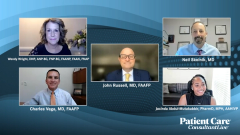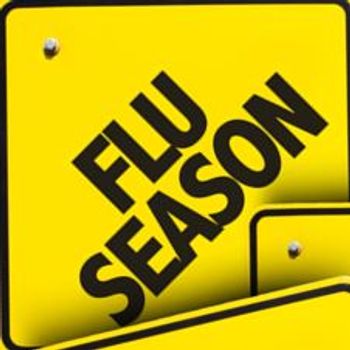
Role Of Real-World Data To Explore Influenza Vaccination Health Outcomes
Dr Neil Skolnik reviews the role of real-world data to examine the efficacy of influenza vaccines and their impact on influenza related complications.
Episodes in this series

John Russell, MD, FAAFP: So, Neil, I know you love the concept of real-world data. Could you explain to people because, you know, I'm not sure everyone has been using that their whole career. What is real-world data? Is it more than just the terminology?
Neil Skolnik, MD: Yeah, well, essentially, John, you're right, real-world data. And we have this opportunity now with our large data sets to really get great information. Real-world data is different than prospective randomized controlled trials that we're all aware of. Blinded looking at a forward. Real-world data are what used to be called cohort studies. We look back in time and then we see what the outcomes are. It's reemerged in importance because of our large data sets through our electronic health records, meshed with hospital electronic records, also meshed with pharmacy data sets. So, we can actually now look at large numbers of individuals. An example would be vaccination in older adults, large numbers of individuals who have been vaccinated versus those who haven't. And you couldn't do this in a prospective trial. Looking over a million and a half individuals and then we see the outcomes. And that's one of the ways that we know that the high-dose flu vaccine has better outcomes, with regard particularly to hospitalization and even mortality, versus regular dose flu vaccine. In older adults, we can get these large data sets that allow us to see endpoints that we could never have a randomized trial large enough to see that. So, John, you're exactly right. And there's enormous opportunity that we've utilized to look at information through that lens.
Wendy Wright, DNP, ANP-BC, FNP-BC, FAANP, FAAN, FNAP: John, Can I just make one point about what I hope for all of us moving forward? And I've been hoping this since COVID-19 hit, is that COVID-19 changes how we dialog flu. That when you asked about efficacy, I no longer say 40% or 60%. What I say to patients is “If you're vaccinated, you are less likely to not only get flu, but you're less likely to be hospitalized, die from it, or suffer severe complications.” And I hope that we start changing that dialog because COVID-19 taught us that talking about “You're going to have this and you're not going to get COVID-19,” just set us up for failure, and started to create a disbelief and discontent with our patients.
John Russell, MD, FAAFP:And speaking of real-world data and efficacy, there was a 2-year study in New Zealand, where they looked over 2 seasons and they looked at people who were vaccinated against influenza, and they had an 84%, 85% less chance of dying or ending up in the ICU [intensive care unit]. And I think that's our COVID-19 story, right? That [when it is] sniffly COVID-19, and we don't care so much. We want to keep people out of the hospital in the ICU. So, JAM, can you really hit on what are the ACIP [Advisory Committee on Immunization Practices] guidelines that we should be looking forward to for this flu season?
Jacinda Abdul-Mutakabbir, PharmD, MPH, AAHIVP: Right. Absolutely, 100%. And then, of course, we'll be focusing on, at least for intents of this presentation, on our adult patients. So, 18 [years] and up. And like everybody said, the fact that, you know, get a vaccine in the arm, we have a plethora of vaccines to choose from. So, if you are 18 [years] and older, you can get the live attenuated influenza vaccine, but I think that there was a great point made that is for ages 2 to 49. So, as we start to age, as we start to you know—I don't like to say, “get older,” as we get more seasoned, that's [what] folks more seasoned than me have advised [me to say]—so, as we start to get more seasoned, we need a bit more help and a bit more of a boost to our immune system, and I'm so happy that now we do have vaccines that are able to do that. And I think Neil did a phenomenal job explaining them. So, we have Fluzone, which has a bit more of a dose or is a high-dose vaccine, a higher dose than what you would have in the other vaccinations that are available. We also have the Fluad [vaccine] which actually adds adjuvant. So once again, to get just that increase in immunogenicity, as Neil eloquently described. And then finally, we have Flublok [vaccine], which is the recombinant vaccine for people that are [aged] 65 [years] and up. With the real-world data, we've seen that there has been more of a boost for those individuals of that age group. So, as you get more seasoned, like I say, you need a bit more help. So, that's something that we could consider in this, especially because we are really able to get that formulation right by taking just that specific part, that specific gene, and then we go ahead and we replicate that with the recombinant vaccine. I clearly need a stake in the Flublok, right, but I really want to press upon that. It's a great consideration, especially as these viruses change. So, for those that are [aged] 65 and up, we do have a plethora. We have 3 really good options for them, and then for individuals that are immunocompromised, we have the options that are previously described. So, we have our inactivated egg cell-based vaccines. However, we want to really treat with caution with the live attenuated vaccines. We do not want to give those to our immunocompromised patients, and it is because they do not, of course, have that robust immune system. So, we don't want to expose them to what could be a really big and potent aspect of the vaccine. So, those are the things that we have for ACIP. ACIP recommends that we follow. Of course, that timing of when flu season sets in, as Wendy stated, when we're getting the flu vaccines in now, we don't want to risk not protecting someone because we're thinking, “It's not October; it’s not November.” Let's get these vaccines, let's put these in these arms. So, that's all I have.
Transcript is AI-generated and edited for clarity and readability.
Newsletter
Enhance your clinical practice with the Patient Care newsletter, offering the latest evidence-based guidelines, diagnostic insights, and treatment strategies for primary care physicians.



































































































































